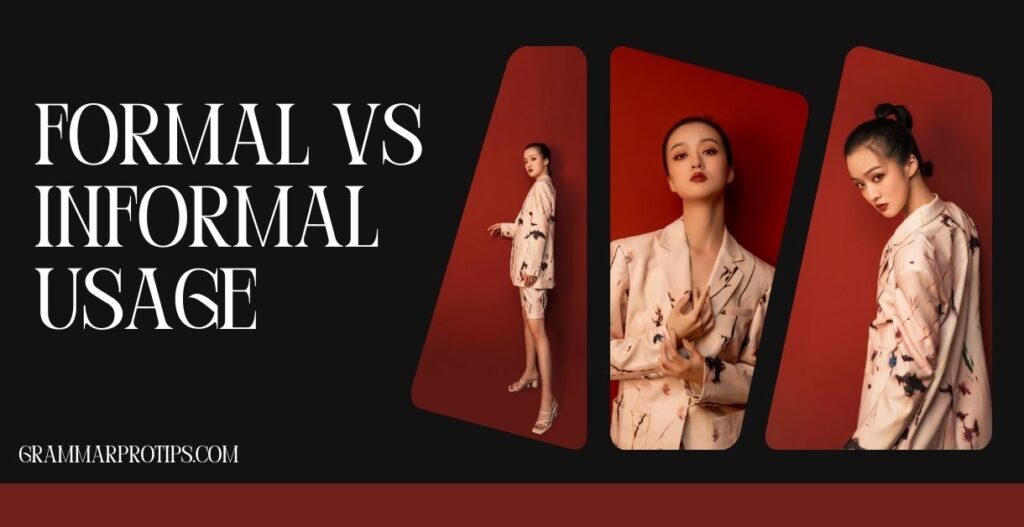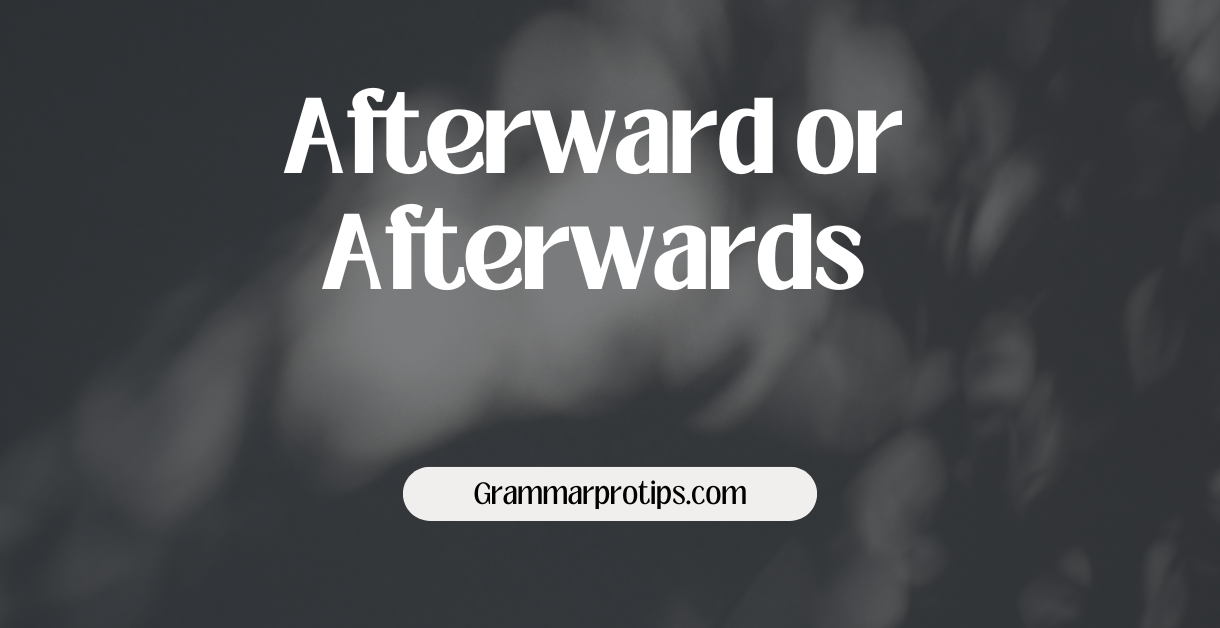In English, there are a lot of subtle differences in word usage that can leave even native speakers scratching their heads. One such example is the debate over whether to use afterward or afterwards.
While both words have similar meanings, they are often used in different contexts or preferred in different regions. Understanding these differences can make your writing clearer and more precise, whether you’re crafting an email, formal letter, or article.
What Are “Afterward” and “Afterwards”?
Both afterward and afterwards are adverbs that refer to events or actions that occur subsequent to a specific time or event. They serve as temporal adverbs, marking a point in time that follows a previous one. In simpler terms, both words mean “after something else has happened.”
For example:
- “I went to the park afterward.”
- “She sent the report afterwards.”
In both cases, the meaning is the same. However, their usage can vary depending on the style preference, region, or even the context of the writing.
Afterward vs Afterwards: Is There a Real Difference?
At first glance, afterward and afterwards seem almost interchangeable. But when you dig a bit deeper, you’ll find that there are some subtle differences depending on your audience and the type of writing you’re doing. Let’s break it down.
1. Regional Usage: American vs British English
One of the most prominent differences between afterward and afterwards lies in regional usage. In general, Americans tend to favor afterward, while British English speakers typically use afterwards more frequently. This distinction is especially apparent in informal writing.
For instance, in American English, you might write:
- “I’ll call you afterward to discuss the details.”
Meanwhile, in British English, the same sentence would more likely be phrased:
- “I’ll call you afterwards to discuss the details.”
This difference might seem trivial, but it can matter in certain situations. For example, when writing for a British audience or adhering to a British style guide (like the Oxford Dictionary), it’s safer to use afterwards. Conversely, if you’re writing for an American audience or following the AP Style or Chicago Manual of Style, you might lean toward using afterward.
Example (Email):
British English (informal email to a friend):
“Hi James,
I hope the meeting went well! Let me know afterwards if you’d like to discuss any next steps.”
American English (informal email to a friend):
“Hi Sarah,
I hope everything went smoothly! Let me know afterward if you want to catch up on what happened.”
2. Formal vs Informal Usage

In both formal writing and conversational contexts, afterward is generally preferred in American style guides, while afterwards is often the choice for British English. However, there isn’t a hard-and-fast rule in many cases. Both words are used interchangeably in most informal settings, and your choice might come down to personal preference or regional dialects.
If you’re crafting a more formal letter or business email, consider the following points:
- AP Style: Afterward is preferred in AP Style, commonly used in journalism and newswriting.
- Chicago Manual of Style: Both afterward and afterwards are acceptable, but afterward is usually the favored term.
Example (Formal Email):
Using “Afterward” in AP Style:
“Dear Mr. Smith,
I will be reviewing your proposal and will send feedback afterward.”
Using “Afterwards” in British English:
“Dear Mr. Jones,
I will review your documents and provide feedback afterwards.”
Grammatical Nuances: Afterward vs Afterwards
From a grammatical standpoint, there is no real difference in meaning between afterward and afterwards. Both are adverbs that indicate a time reference, typically to describe events that happen after another event or action. However, the difference lies primarily in usage and style preferences.
- Afterward is generally used in American English, especially in more formal contexts.
- Afterwards is more common in British English and informal writing.
3. Afterward or Afterwards: Synonym and Alternatives
Both afterward and afterwards share many synonyms and can be replaced with similar expressions depending on the context:
- Later
- Subsequently
- After
- In due course
While these words can often be swapped for afterward or afterwards, it’s important to choose the right synonym to maintain the flow of your sentence.
Example:
- “We will discuss the proposal later.”
- “The decision was made subsequently.”
Examples: Afterward or Afterwards in Context
Let’s take a look at a few scenarios to show you exactly how afterward and afterwards might play out in real-world contexts.
1. Post-Meeting Follow-Up

After a meeting or an event, you often follow up with an email or message to summarize or discuss what happened. Whether you use afterward or afterwards can depend on the formality of the message and the audience you’re writing to.
Example (Email):
- “Hi John,
Thank you for attending the meeting today. I’ll send the meeting minutes afterward so you can review the key points.”
Here, afterward works because the email is written in a relatively informal tone, and it’s likely directed toward a North American audience. If the recipient were British, you might choose afterwards instead.
2. Event-Related Language in Narratives
If you’re narrating events in a story or a report, you might use afterward or afterwards to mark the passage of time.
Example (Narrative):
- “She left the party early, and afterwards, she felt a strange sense of relief.”
Here, either word could fit, though afterwards might feel slightly more natural in a British context.
3. In the Context of English Grammar
When discussing adverb forms or grammar in a lesson or book, clarity is key. Since afterward and afterwards are both adverbs that modify verbs, they can often be used in a similar manner in sentences.
Example:
- “The project was completed on Monday, and afterward, the team took a break.”
Here, the adverb afterward clearly marks the sequence of events.
Regional Style Guide: Oxford Dictionary and AP Style
Oxford Dictionary: Afterward or Afterwards Is There Any Difference?
According to the Oxford Dictionary, afterward is a preferred choice in American English, whereas afterwards is more commonly found in British English. Both words are understood universally, so it’s important to choose the one that aligns with your audience and the regional variations you want to represent.
AP Style: Afterward or Afterwards?
In AP Style, afterward is the preferred term, and you’ll see it in most journalistic contexts. This style guide aims for clarity, brevity, and precision, which is why afterward is often favored in shorter, more to-the-point writing.
Conclusion: Afterward or Afterwards?
In the end, the choice between afterward and afterwards is largely based on regional preferences, writing style, and the tone of your work.
- If you’re writing for an American audience, afterward will likely be your go-to choice.
- If your audience is more familiar with British English, or you’re following a British style guide, afterwards might feel more appropriate.
- In formal writing, particularly within business communications, both can work, though afterward might be the safer bet in American English.
Ultimately, whether you choose afterward or afterwards comes down to your style preference, context, and the audience you’re addressing. Keep it consistent, and remember to read your work aloud to ensure the flow sounds natural.

“Smith is the dedicated admin of [grammarprotips.com], a platform focused on enhancing grammar skills. With a passion for language and education, Smith strives to make grammar accessible and enjoyable for learners of all levels. Committed to delivering high-quality content, Smith continually explores innovative ways to help users master the complexities of grammar.”

